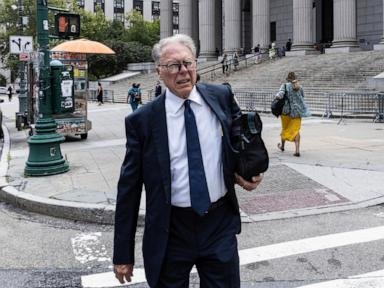NEW YORK — The second phase of the trial in a civil lawsuit against the National Rifle Association began Monday in Manhattan, with New York Attorney General Letitia James seeking an independent monitor to oversee the powerful gun rights group’s finances.
In addition, the Democrat wants Wayne LaPierre, the organization’s former CEO, banned from returning to the NRA. She is also asking for other restrictions on John Frazer, the NRA’s corporate secretary and former general counsel. James had previously asked that LaPierre be banned from holding leadership positions or collecting funds for charitable organizations conducting business in New York, but that is no longer the case.
In the trial’s first phase, a jury in February found LaPierre misspent millions of dollars of NRA money to fund an extravagant lifestyle that included exotic getaways and trips on private planes and superyachts.
Jurors also found the NRA failed to properly manage its assets, omitted or misrepresented information in its tax filings and violated whistleblower protections under New York law.
NRA lawyers argued Monday that an independent monitor isn’t necessary because the organization is enhancing its internal oversight, including through annual audits, hiring a compliance officer, and disclosing to members how it spends on executive travel and other perks.
Jeffrey Tenenbaum, a lawyer testifying for the state as an expert in nonprofit law, acknowledged that the NRA had made some strides toward transparency — but said it had only done so in the wake of James’ lawsuit. In lieu of an independent monitor, there’s nothing guaranteeing the organization will continue to adhere to its reforms, he said.
Among other things, Tenenbaum said, the organization’s policy manual is “a dumpster fire.”
The second phase of proceedings in Manhattan state court is a bench trial, meaning there is no jury and the judge will hand down the verdict. It is expected to last about two weeks.
Charles Cotton, an NRA board member, was the first witness to take the stand. He revealed that the organization did not have a succession plan in place when LaPierre announced his retirement in January, just before the start of the trial’s first phase — suggesting his exit was hasty and not expected.
Cotton, whose term as NRA president ended in May, rejected a state lawyer’s suggestion that the organization’s “old guard” was standing in the way of reforms. At the same time, he conceded it had not reprimanded or punished LaPierre for his spending.
LaPierre is not required to attend, according to his lawyer, but he was in the courtroom Monday.
The NRA, through its lawyer, called the request for a court-appointed monitor to oversee administration of the organization’s charitable assets “unwarranted.”
William Brewer, a lawyer for the NRA, said Friday that the organization was the victim in the case and has since taken a “course correction” to make sure it is fully complaint with the state’s nonprofit laws.
“The focal point for ‘phase two’ is the NYAG’s burden to show that any violation of any law is ‘continuing’ and persistent at the NRA,” he said in an email. “This is a burden the NYAG cannot meet.”
Spokespersons for James declined to comment ahead of Monday’s proceedings, as did a lawyer for LaPierre. An email also was sent to Frazer’s lawyer.
Bob Barr, the organization’s president and a former congressman, and Douglas Hamlin, the NRA’s CEO, are among the current employees and board members also listed as potential witnesses, according to James’ office.
The first phase of the trial cast a spotlight on the leadership, organizational culture and finances of the lobbying group, which was founded more than 150 years ago in New York City to promote rifle skills and grew into a political juggernaut that influenced federal law and presidential elections.
The jury ordered LaPierre to repay almost $4.4 million to the organization he led for three decades, while the NRA’s retired finance chief, Wilson “Woody” Phillips, was ordered to pay back $2 million.
Last week, James’ office announced details of a settlement it reached with Phillips.
Under the agreement, he agreed to be banned for 10 years from serving as a fiduciary of a not-for-profit organization in New York. He also agreed to attend training before returning to any such position.
The deal means Phillips, now retired, doesn’t have to take part in the proceeding that started Monday, but he is still on the hook for $2 million in damages from the initial verdict.
___
Follow Philip Marcelo at twitter.com/philmarcelo
